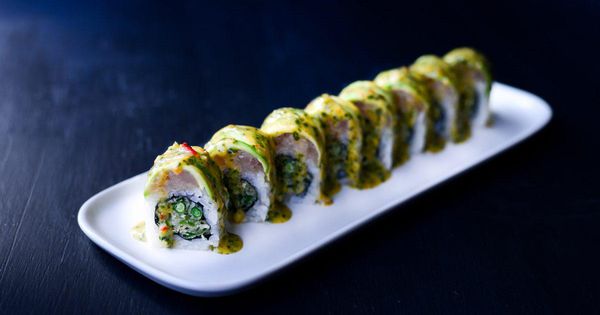Green machine rollSustainable Restaurant Group
If you’re in the Bay Area, craving sushi and concerned about seafood sustainability, there’s good news coming your way. Bamboo Sushi, already operating in Portland, OR and Denver, CO, is opening three new locations in the San Francisco Bay Area. Bamboo Sushi was the first sustainable sushi restaurant in the world according to the Marine Stewardship Council and the Monterey Bay Aquarium, two groups the restaurant chain works with to ensure the sustainability of their seafood sourcing. Kristofor Lofgren, the CEO and founder of Sustainable Restaurant Group, the parent company of Bamboo Sushi and Quickfish Poke Bar, plans to show the world just what “sustainability at scale” looks like.
For Lofgren, a San Francisco native, the new restaurant openings are “a coming home.” When I asked him what excites him most about the new locations, he said he looks forward to being with family and friends, making new partnerships, and being in “one of the most conscientious food cities in the world.” The three new Bamboo Sushi locations cover every major location in the Bay Area. The first will be situated at the entrance of Westfield Valley Fair in Santa Clara, directly across from the brand new Apple Store. Next up is a new location at the City Center Bishop Ranch retail center in San Ramon, which is designed by the respected architect Renzo Piano. Lastly, a Bamboo Sushi is planned to open in downtown San Francisco.
It’s not just the seafood at Bamboo Sushi that is sustainable. In order to grow to a multi-national company, Lofgren believes that all aspects of the group’s operations must be eco-friendly, from the materials used to build the restaurants, to the wages paid to employees. Sustainable Restaurant Group is a certified B Corporation, “meeting the highest standards of verified social and environmental performance, transparency, and accountability.” Lofgren wants Sustainable Restaurant Group “to be the Google of restaurants” by building trust among customers. How? Both Bamboo Sushi and Quickfish Poke Bar provide full and radical transparency about their seafood sourcing. This includes where the fish came from, what it took to get them to your plate, and how Bamboo Sushi is maintaining a zero carbon footprint menu.
The folks at Sustainable Restaurant Group want to provide transparency about where their seafood is coming from. Menus are seasonal, changing 2-4 times per year. Additionally, each restaurant highlights a number species unique to its location. Some fish and shellfish, such as their Ora King Salmon from New Zealand, and Pot Caught Octopus from Spain are imported, but still meet the strict sustainability criteria in place at Sustainable Restaurant Group. However, flying in fish from overseas is not a bragging right for Lofgren. “We’re fortunate to be in the United States,” Lofgren said, “where fisheries are managed sustainably.” He added that 80% of the seafood served at Bamboo Sushi is domestic. As Sustainable Restaurant Group grows, Lofgren aims to find new fisheries closer to home, to promote delicious and nutritious American product, while also cutting down on their carbon footprint.
Ora King Salmon YakumiSustainable Restaurant Group
It’s exciting to hear Lofgren talk about getting people more engaged with seafood sustainability, and not just those who can afford a $100 tasting menu. “We want to get to people with an average family income” Lofgren said. He wants to create a space where customers can feel comfortable having “conversations about making trade offs and learning about sustainability in seafood.” His enthusiasm for sustainable seafood is contagious, and he wants to spread the news to other restaurants – “We want people knocking on our door asking how to do this.”

